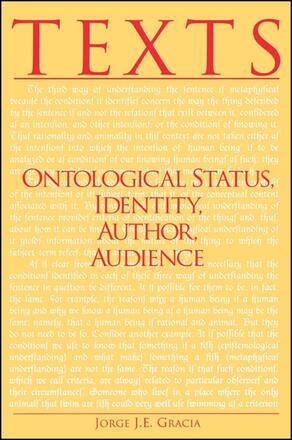
Texts
Ontological Status, Identity, Author, Audience
Alternative formats available from:
Provides an ontological characterization of texts, explores the issues raised by the identity of various texts, and presents a view of the function of authors and audiences, and of their relations to texts.
Description
This book completes the theory of textuality whose logical and epistemological dimensions were presented in Gracia's book, A Theory of Textuality: The Logic and Epistemology (SUNY Press). It provides an ontological characterization of texts consistent with the conception of texts defended in the earlier book; it explores the issues raised by the identity of various texts; and it presents a view of the identity and function of authors and audiences and of their relations to texts. The discussion is systematic, comprehensive, and detailed. Gracia raises all of the important issues related to texts within the areas he explores and takes into account the pertinent literature. The style is argumentative and clear, and the position Gracia defends is based on common sense. He stays clear of the extreme views some contemporary authors have taken with respect to texts and textuality.
This is the only book of its kind. It is the first to develop a comprehensive theory and to adopt an integrative approach where the issues and their solutions are seen as closely connected.
Jorge J. E. Gracia is Professor in the Department of Philosophy at State University of New York at Buffalo. His other works include Philosophy and Literature in Latin America: A Critical Assessment of the Current Situation (with Mireye Camurati); Individuality: An Essay on the Foundations of Metaphysics; Philosophy and Its History: Issues in Philosophical Historiography; Individuation in Scholasticism: The Later Middle Ages and the Counter-Reformation, 1150–1650; Individuation and Identity in Early Modern Philosophy: Descartes to Kant (with Kenneth F. Barber), and A Theory of Textuality: The Logic and Epistemology, all published by SUNY Press.
Reviews
"Gracia's argument is impressively clear and to the point. He develops a complex taxonomy of the distinctions he must marshal in order to fully explain what a text is, describing and defending each distinction with care and in detail. His conclusions follow reasonably from his arguments and he does an excellent job anticipating criticisms and answering them. Gracia is fully informed by the relevant philosophical scholarship on texts and on the wide range of metaphysical issues of which he must take account in order to establish his position. " — George Allan, Dickinson College